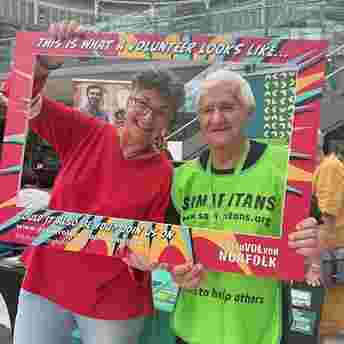Resources for Volunteers
Whether you're considering volunteering for the first time or looking to make the most of your experience, this page is packed with practical advice to help you.
Discover the many benefits of volunteering, from personal growth and skill development to making valuable connections and even paving the way for future career opportunities. Volunteering is more than just giving back - it’s a chance to grow, learn, and open new doors and these resources will help you to achieve that!
Ready to start your volunteer journey? Head over to Get InVOLved Norfolk to find opportunities and start volunteering!
Why Volunteer? The Benefits of Giving Back
Getting Started: What to expect when you become a volunteer
Why Volunteer? The Benefits of Giving Back
The benefits of volunteering

The benefits of being a trustee
Becoming a charity trustee allows you to make a meaningful impact by guiding an organisation’s strategy and ensuring it meets its mission effectively. It’s also a great opportunity for personal growth, helping you develop leadership, governance, and decision-making skills while giving back to the community.
This article details more reasons on why you should consider becoming a trustee and this page provides further resources.
Have a look at our dedicated Trustee page on Get InVOLved Norfolk and find current opportunities to apply for.

Volunteer Stories
The best way to understand the benefits of volunteering is by hearing directly from those who have experienced it.
Voluntary Norfolk’s YouTube page features numerous volunteer stories that showcase their journeys and the impact they've made. These stories can inspire you to get involved and help you discover the right volunteering opportunity for you.
Getting Started: What to expect when you become a volunteer

What is the Voluntary Sector?
If you’re new to volunteering, you might be wondering what the voluntary sector is and how it works. Simply put, VCSE (Voluntary, Community and Social Enterprise) organisations are those that focus on helping others rather than making a profit. These groups rely on volunteers to support a wide range of causes. Understanding the voluntary sector can help you find the right opportunity that matches your interests and skills while making a real difference.
This guide from Reach provides a comprehensive introduction to the voluntary sector.

Finding a role
Not sure where to begin? With so many roles available, it can feel overwhelming. Start by narrowing down your interests—how much time can you commit? Do you prefer to travel or volunteer remotely? Are there specific skills you'd like to use? What causes matter most to you?
For more ideas read this blog post or take the talent scan on Get InVOLved Norfolk which can help you discover the perfect opportunities.

Volunteer Interviews
Not all volunteer roles require an interview, but it’s helpful to be prepared just in case. Interviews can vary from a brief phone call to a face-to-face meeting, depending on the organisation, the role, and the skills needed.
This article details common questions you may encounter and how to prepare effectively.
Boost Your Career: How Volunteering Enhances Employability

How to include volunteering on your CV
This CharityJob article "How to Include Volunteering on Your CV" offers practical advice on effectively incorporating volunteer experience into your job applications, particularly for those pursuing roles in the charity sector. It highlights how volunteering demonstrates dedication, passion, and key skills valued by employers, including leadership, teamwork, problem-solving, and project management.

Volunteer skills: Definitions and examples
This article from Indeed explores the concept of volunteer skills, provides examples, offers tips for improving these skills, and explains how you can leverage the skills gained through volunteering to land your next job.
Support and Wellbeing
Self-Kindness Toolkit
Prioritizing your well-being is essential for supporting both yourself and those around you. It not only benefits your daily health but also strengthens your ability to navigate uncertainty and stress.
The British Red Cross offers a free, downloadable self-kindness toolkit filled with activities designed to help you build resilience, manage stress and worries, and foster meaningful connections with others.
Local Support
Commonly asked questions about volunteering
Is there an age limit?
There’s no upper age limit on volunteering. Some organisations’ insurance policies do not cover you if you’re under 16 or over a certain age. If in doubt, ask the organisation of their policies and any risk assessments they have in place.
Does volunteering impact benefit claims?
According to Government guidance you can volunteer and claim benefits if:
- the only money you get from volunteering is to cover expenses, like travel costs
- you continue to meet the conditions of the benefit you get
You may also need to inform your benefit provider of the voluntary work you are undertaking - get in touch with them if you have any other questions.
Do I need experience or training to volunteer?
This will depend on the role you are applying for. Many roles require no prior experience, while others may need specific skills, qualifications, or training. If you do require training this site should be able to direct you to the best place to access it and lots of organisations will also have their own training and induction programmes.
Do I need a background check (DBS) to volunteer?
Some roles, particularly those involving children or vulnerable adults, require a Disclosure and Barring Service (DBS) check. The organisation you volunteer with should arrange this for you.
Can I claim expenses while volunteering?
Many charities reimburse volunteers for travel and other necessary expenses, but it’s best to confirm with the organisation beforehand.